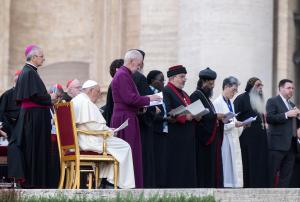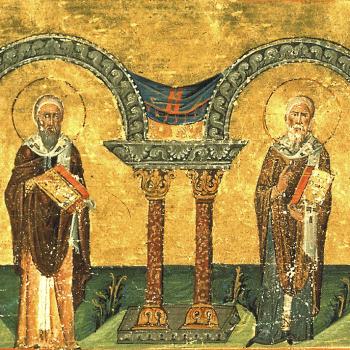
The modern ecumenical movement has brought about great insight into the Christian past as it has learned how often Christians became divided against each other, not because of any real, substantial dogmatic reasons, but because they failed to follow Christ’s expectation for them to be people who showed the world the way of love. Christ said the world should know they are Christians by their love; instead, animosity, distrust, and the pursuit of power and influence, led Christians to fight against each other, severing the bonds Christ wanted them to form. They fought each other for all kinds of reasons, including how best to express the Christian faith in words. Instead of listening to each other and recognizing the wide variety of ways possible to point to the greater truth of Christian revelation, Christians established and used various presentations of the faith, not only for themselves, but for others. That is, Christians demanded everyone express the truth in the same way or else be deemed as a heretic, turning the words used into symbolic tokens to rally around and promote. They did not engage each other with charity, for if they had, they would have given the best interpretation to what the other said and saw how what the others said was often the same truth presented in a different fashion.
Words are important, but they change meaning over time, even as different people can and often imply different things by the same words. This is why, no matter how careful someone might be in constructing a description of the faith, their words can be misinterpreted and judged heretical due to a simple misunderstanding, or, of course, due to malice. Many who thought themselves to be fit judges as to what is and is not orthodox, and what is or is not heresy, did so based upon whether or not someone accepted and used particular formulations of the faith. They defended the word choice used in such formulations so much that they became hostile to any other possible formulations of the faith, even if they could be interpreted in an orthodox fashion. Similarly, those whom they opposed would then likewise do the same, leading to needless division in the church. We can see this happening around the use of the filioque in the recitation of the Nicene Creed, where those who deny it interpret the words, “and the Son” in the Nicene Creed to make it a heretical saying, but in doing so, they ignore how it is interpreted by those who accept and use it. If they listened, they would see that both those who use the filioque and those who do not can and do imply the same dogmatic teaching. This also happened around Christological definitions. Thanks to the ecumenical movement, Christians now come together to listen to each other, and learn what everyone means by the words the say, leading many to realize they are in fundamental agreement with each other.
While, historically, many apostolic churches (Catholic, Orthodox, Non-Chalcedonian Orthodox) have developed different ways to express who they believe Christ to be, that is, their own Christological definitions, the leaders of those churches have recently come together to engage in dialogue and realize they did not really disagree with each other. They misinterpreted each other, but now, having listened, they can say, alongside St. John Paul II and Mar Dinkha IV: “The Lord’s Spirit permits us to understand better today that the divisions brought about in this way were due in large part to misunderstandings.”[1] When those misunderstandings are examined, they can be cast aside, similar to the way St. Athanasius was able to come to an understanding with many who embraced the term homoiousios, or St. Cyril of Alexandria with John of Antioch:
Whatever our christological divergences have been, we experience ourselves united today in the confession of the same faith in the Son of God who became man so that we might become children of God by his grace. We wish from now on to witness together to this faith in the One who is the Way, the Truth and the Life, proclaiming it in appropriate ways to our contemporaries, so that the world may believe in the Gospel of salvation. [2]
Similar conclusions have been reached by Orthodox and the Oriental Orthodox Churches, which is why they have been able to realize they are promoting the same teachings about Christ:
In the light of our Agreed Statement on Christology as well as of the above common affirmations, we have now clearly understood that both families have always loyally maintained the same authentic Orthodox Christological faith, and the unbroken continuity of the apostolic tradition, though they have used Christological terms in different ways. It is this common faith and continuous loyalty to the Apostolic Tradition that should be the basis for our unity and communion.[3]
Only when it is accepted that, when speaking of Christ, the words we use are meant to point to and convey a truth beyond which the words themselves can express, do we find ourselves truly open to listen to a variety of Christological expressions and discern the unity which lies behind them.
The truth, in a conventional sense, can be expressed in and through words, but it must always be understood that the conventions themselves are not the same thing as the truth being expressed through them. This truth is a relative truth, that is, it is true so long as the convention used is understood to be a convention pointing to the absolute truth and not the absolute truth in and of itself. For, once this is accepted, Christians will be much more open to the use of a variety of conventions, some which in external appearance might seem to contradict each other, to point to the absolute truth which lies beyond the conventions themselves. When conventions are turned into something they are, into absolutes, they can become a wedge used to split apart the Christian community. Then, sadly, Christians, while claiming they are doing this all to defend truth, show they go against the spirit of truth as they go against the love the truth is meant to establish in them.
St. John Paul II made a similar point in his call to Christian unity:
In the first place, with regard to doctrinal formulations which differ from those normally in use in the community to which one belongs, it is certainly right to determine whether the words involved say the same thing. This has been ascertained in the case for example of the recent common declarations signed by my Predecessors or by myself with the Patriarchs of Churches with which for centuries there have been disputes about Christology. As far as the formulation of revealed truths is concerned, the Declaration Mysterium Ecclesiae states: “Even though the truths which the Church intends to teach through her dogmatic formulas are distinct from the changeable conceptions of a given epoch and can be expressed without them, nevertheless it can sometimes happen that these truths may be enunciated by the Sacred Magisterium in terms that bear traces of such conceptions. In view of this, it must be stated that the dogmatic formulas of the Church’s Magisterium were from the very beginning suitable for communicating revealed truth, and that as they are they remain for ever suitable for communicating this truth to those who interpret them correctly”.[4]
John Paul II indicated that we should reflect upon the meaning of the dogmatic formulas used, that is, the meaning of the conventions used to represent the truth, for the more we do that, the better Christians will be able to work together and come together in love and understanding. Dogmatic definitions, even if they are conventions, are important, because they help focus the Christian community on the truths of the faith, but that purpose becomes lost when they confuse the convention for what is being pointed by them. Just as we should never confuse a finger pointing to the moon with the moon itself, so we should not confuse the conventional pointers to the truth with the absolute truth itself. Sadly, however, many have done just that, and in doing so, have used the dogmatic formulations and the word choices made to establish them as a tool to divide Christians.
It is one thing to accept the conventions used to present a dogmatic truth, and it is another to say only certain conventions can be used to present that dogmatic truth. The latter notion creates unnecessary divide in the church, as it becomes more focused on the words used than it is in the dogmatic teaching itself. Christianity becomes tribalistic and fundamentalistic with such an attitude. This is why Christian need to accept the former premise, for it will help them to come together and embrace each other as Christ intended them to do. It is very important for Christians to listen to each other instead of engaging in apologetical debates, for such debates end up reifying division in the church instead of bringing Christians together, as those involved in them want to prove themselves superior to the other by challenging and undermining all possible formulations of the faith which they do not themselves use. Apologetics, in this fashion, ends up becoming a form of ideological polemics, and so should be rejected:
In this regard, ecumenical dialogue, which prompts the parties involved to question each other, to understand each other and to explain their positions to each other, makes surprising discoveries possible. Intolerant polemics and controversies have made incompatible assertions out of what was really the result of two different ways of looking at the same reality. Nowadays we need to find the formula which, by capturing the reality in its entirety, will enable us to move beyond partial readings and eliminate false interpretations.[5]
Ecumenical dialogues can have many different aspects to them. Perhaps the most important one is the simplest of all, which is to have all sides involved to be willing to listen to each other, to pay attention, and discern if, despite external appearances, they might actually agree with each other on fundamental issues. For this to happen, everyone must be able to express their faith, which not only means to present the dogmatic formulations they use to present the faith, but to explain them and what they actually mean. When this is done, Christians will often come to see the have let misunderstandings get the best of them, misunderstandings which got in the way of the mutual love and respect they should have had for each other. But, this is not to say they will always agree. They can still have many differences, differences which must also be worked out, but the hope is that when they understand each other better, when they come together with good will instead of malice, they should be able to work out those differences and find a way to truly come together in Christian unity. This means, despite the way many critics portray ecumenism, ecumenical dialogues are not about “false irenicism.” Differences, when they exist, are recognized and not glossed over. But those differences are no longer being used to reinforce mutual distrust and disdain. Ecumenical dialogues represent Christians listening to Christ and his expectation that they come together as one. They do this by promoting humility and love, so that in their dialogues, Christians can come together, learn from each other, and so explore the greater truth together, with each side apprehending something which they had not previously apprehended. If they do this enough, the hope is that they will find what they need to form the bridge which can then unite them. But in doing so, they must not repeat the mistakes of the past, and use whatever formulations they develop together as new wedges to create new divisions in the church. Thus, Vatican II said:
The way and method in which the Catholic faith is expressed should never become an obstacle to dialogue with our brethren. It is, of course, essential that the doctrine should be clearly presented in its entirety. Nothing is so foreign to the spirit of ecumenism as a false irenicism, in which the purity of Catholic doctrine suffers loss and its genuine and certain meaning is clouded. [6]
Ecumenical agreements, such as the various Christological agreements made between the apostolic churches, should not be seen as a sign of false irenicism, but rather, as a sign that Christians finally have come to understand each other and discern how they are in fundamental agreement with each other. There is no truth which is being denied by such agreements. But what they do affirm is that there will be many variations used to represent the same faith, and each side can continue to use their traditional conventions so long as they recognize that other conventions can and do teach the same thing.
Apologetics, true apologetics, is about helping others understand the truth which the apologist has apprehended. It is not about undermining others and the elements of the truth they already understand. Apologetics, therefore, should not lead to debate. When it is all about debate, it is no longer true apologetics, as those involved in the debate no longer desire to listen to and learn from each other, but to put each other down and deny the validity of the other’s position. When apologetics is promoted by debates, it serves more to undermine Christian unity than it does to bring Christians together. An apologist involved in such a debate is more interested in wining the debate, with whatever rhetorical flourish he or she can use to do so, than they are in the truth itself. The glory of Christ is not found in such debate.
Catholics, indeed, all Christians, should follow a better way. They should desire to learn from each other, embracing the way of ecumenism and the humility and love which should lie at the forefront of ecumenical dialogues. That way, they can truly help each other understand the truths they have apprehended, and discern how close or far apart they are from each other. “At the same time, the Catholic faith must be explained more profoundly and precisely, in such a way and in such terms as our separated brethren can also really understand.” [7] As a result of such dialogue, Christians might need to establish new conventions, new ways to engage the issues being addressed, ones which all sides find easily acceptable, instead of trying to preserve old conventions and force them upon all:
Because by its nature the content of faith is meant for all humanity, it must be translated into all cultures. Indeed, the element which determines communion in truth is the meaning of truth. The expression of truth can take different forms. The renewal of these forms of expression becomes necessary for the sake of transmitting to the people of today the Gospel message in its unchanging meaning.[8]
This is possible because, of course, the truth found in such conventions is what is being pointed by them and not the conventions themselves. The words used are important, but they are not absolutes. Words change meaning. Words are incapable of comprehending the absolute truth. So long as become so focused and stuck upon particular conventions, particular words, thinking we must force all to use them, we will find ourselves distant from the Word beyond all words, and find ourselves becoming divided due to the distance we keep from the Word. When we look at the Word, and let the Word direct us, we will be able to better reflect the Word in our words, accepting a variety of such reflections, and so not become so tribal as to assert only one reflection, one convention represents or apprehends the truth of the Word.
[1] St. John Paul II and Mar Dinkha IV, “Common Christological Declaration” (11-11-1994). Vatican translation.
[2] St. John Paul II and Mar Dinkha IV, “Common Christological Declaration.”
[3] Joint Commission Of The Theological Dialogue Between The Orthodox Church And The Oriental Orthodox Churches, “Second Agreed Statement” (1990). Taken from https://orthodoxjointcommission.wordpress.com/2013/12/14/second-agreed-statement-1990/ .
[4] St. John Paul II, Ut Unum Sint. Vatican translation. ¶38.
[5] St. John Paul II, Ut Unum Sint. ¶38.
[6] Vatican II. Unitatis redintegratio. Vatican translation. ¶11.
[7] Vatican II. Unitatis redintegratio, ¶11.
[8] St. John Paul II, Ut Unum Sint, ¶19.
Stay in touch! Like A Little Bit of Nothing on Facebook.
If you liked what you read, please consider sharing it with your friends and family!
N.B.: While I read comments to moderate them, I rarely respond to them. If I don’t respond to your comment directly, don’t assume I am unthankful for it. I appreciate it. But I want readers to feel free to ask questions, and hopefully, dialogue with each other. I have shared what I wanted to say, though some responses will get a brief reply by me, or, if I find it interesting and something I can engage fully, as the foundation for another post. I have had many posts inspired or improved upon thanks to my readers.












